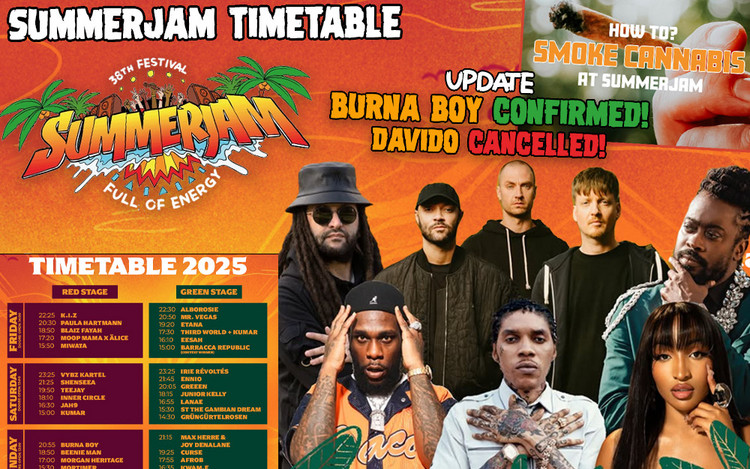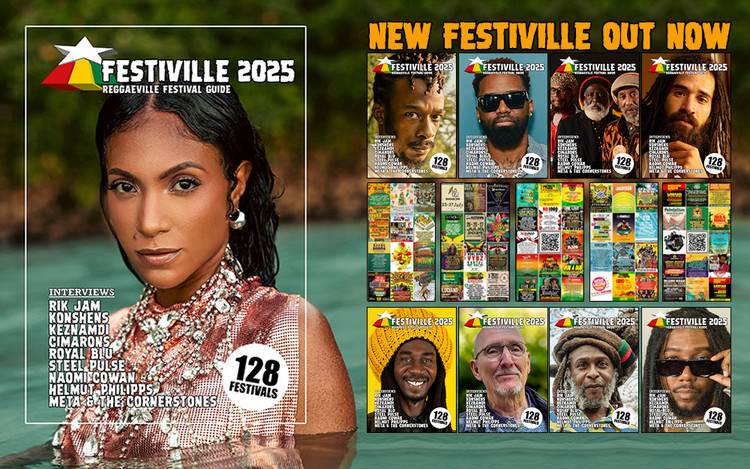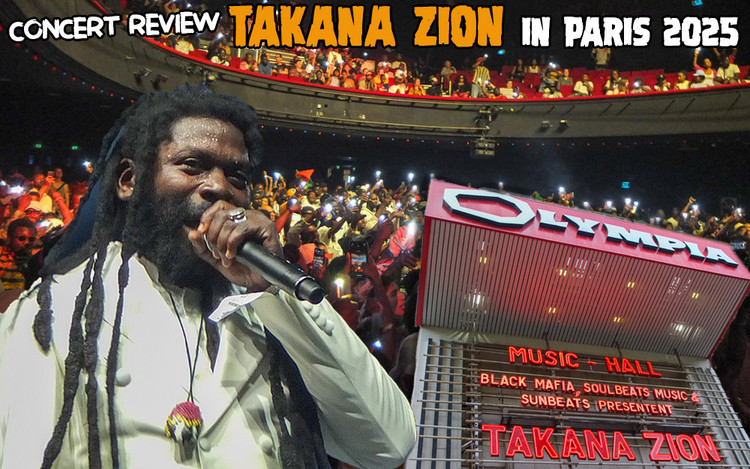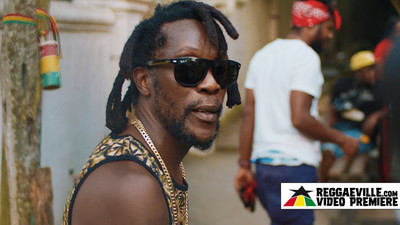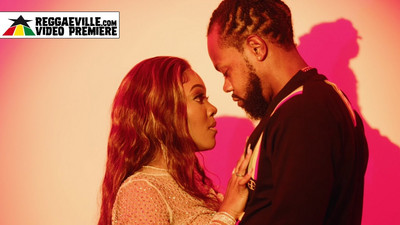Jah9 ADD
Jah9 - The 'Note To Self' Interview
03/16/2020 by Angus Taylor
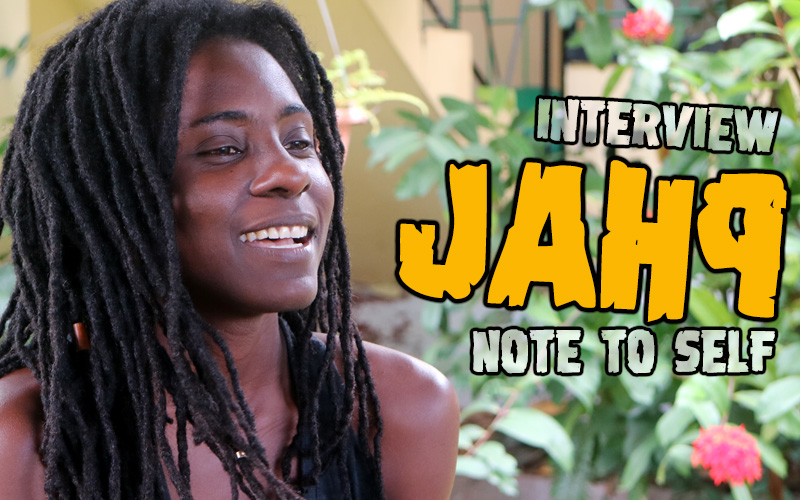
Reggae poet, singer-songwriter and yoga instructor Jah9 just released her third album Note To Self via VP Records. Co-produced with Clive Hunt, Jeremy Harding, Teflon, Puraman, Runkus and Iotosh Poyser, it's an ambitious self-reflective concept record - featuring three tracks from 2018’s Hunt-helmed Feelings EP, plus nine newer songs and three poetic interludes.
It strikes the balance between the catchy, crowd-pleasing roots of Rory Stone Love-produced debut New Name and the meditative art of self-curated follow-up 9. Uptempo EP material and new duet with Pressure Busspipe, You and I, interact with slower, contemplative combinations with Chronixx (Note To Self), Tarrus Riley (Ready To Play) and UK rapper and academic Akala (New Race).
At the same time, it's Jah9's most adventurous album musically and emotionally. She sings soul, deejays dancehall and even raps. She also shares her inner struggles with insecurity and self-doubt - through the prism of yoga, wellness and Rastafari.
Angus Taylor spoke to Jah9 on two occasions: in 2019 at her house in Jamaica and in March 2020 on the phone in Kenya (where she was preparing to release Note To Self during her annual Feel Trip yoga retreat). The below interview is a composite of the two - with the EP portion discussed in Jamaica and the remainder in Kenya. As ever, she went deep...
The Feelings EP has three songs on it, one dealing with the mind, one dealing with the body and one with the heart.
That's pretty much it. Once you listen to the songs you can kind of connect which is which. I wanted that to begin because the EP is an introduction to the mindspace I'm in for the album. And so dealing with feelings first and moving from feelings into real exploration of the self. Because all the songs are kind of pointing back at me. So three songs at the exploration of the mind, the heart and the body are a nice way to introduce what's about to happen next.
Clive Hunt, who worked with you on the EP, is deeply involved in the album. You started recording with him when you did Bloody City on the Dennis Brown tribute album that VP put out...
I met Clive when I was wrapping up the 9 album production. He sat with me through that and listened and gave his feed forward and I got an opportunity to work and see his method and to have him observe a bit of my method too. It has been a really awesome opportunity to observe and learn from someone who feels so limitless in what he can do in terms of sound. He is an arranger so he'll always find a way to bring the vision you have in mind forward and he always has a fullness of what he thinks a thing can be.
He's not going to necessarily stop you from doing what you want to do. I'm really speaking about my experience of the relationship with him because that's what I've cultivated. So he is a lot more open with me in terms of allowing me a certain level of freedom to maybe experiment with something that's a little non-traditional. But it's not wrong so let's try and then find a middle ground or just say straight up “No that's not going to work!” So over the time working with him and becoming more comfortable with him and him becoming more comfortable with me, he kind of knows what I would prefer and he will point out weaknesses as well. The patterns he will see, that he will be able to strengthen me on, that I can observe. That's something I think he appreciates too. A young person who wants to be corrected, who wants to learn and that enthusiasm is mutually inspiring.
So he'll tell you we are co-producing this album. Whatever I'm doing with other people, I bring it to him because I want him to hear. I don't want to be the only one this time around who's holding a vision of the complete thing. I'm bringing him these songs and I'm expressing this vision and he is so open to me, that it's a little frightening sometimes. I'm like “Say something” and he's like “If there's nothing wrong I'm not saying anything! If I'm saying something it means something needs to fix”.
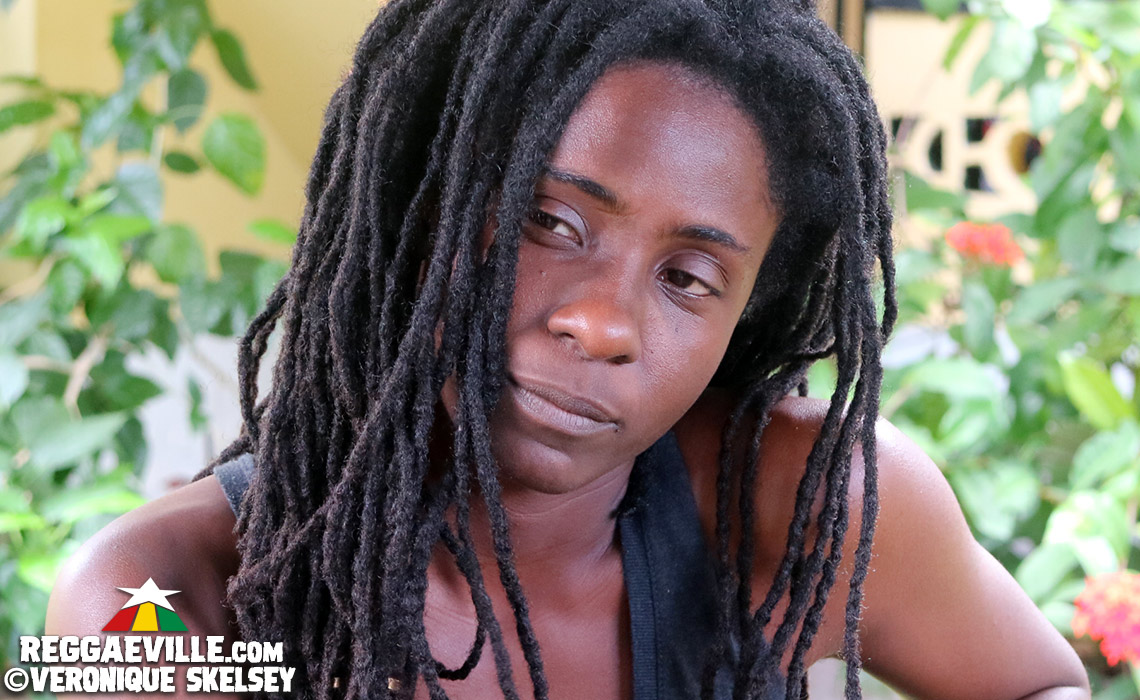
You talk about Clive Hunt not having limits - this is a man who learned to read music looking through a window...
His brain has been specialised. All his reflexes, everything has been specialised to music. His ears. He's not a normal individual. Specialisation can be a dangerous thing in life because then you'll miss out on so many other things but he has truly walked a masterful path in this thing. He has really surrendered to music and sound to the point where it probably has taken him to some very dark places. And because of that it's like he's fearless with it. It's really inspiring to see.
The song Field Trip has an Afrobeat influence...
That song I started in Belgium with Lost Ark Music. We were playing Fela Kuti and a lot of that music for the whole day. We were making roots music but that was the vibe we wanted to translate. Like bring Africa forward into the vibration. I was using my young drummer from my band and that was kind of new territory for him. I wanted the whole thing to be based around the drums and he was in the drum booth playing and then the family got that vibe - my bass player as well. This was during tour time when I was able to stop in Belgium and create and we did a whole heap of things then.
And that's what I took to Jamaica now to flesh out into the record. And so Field Trip is my great experiment for this record. I brought it forward to uncle Clive. He heard it and he was really able to seal the idea that I wanted by putting the roots drums, letting it wheel out of the Afrobeat and ease into the back and forth. That was his recommendation and immediately I connected with that idea. That was going to seal it - the rhythm itself dancing between the two.
How did the concept of the Feel Trip to Kenya arise?
I have a friend who does these tours of Africa. She knows my connection to Kenya and my background as a yoga teacher so she invited me to be a part of the Kenyan leg of her annual trod. It culminates in a yoga festival and she wanted to invite me to come along. I thought this was a perfect way to integrate the themes I'm working on with the album into an actual practical application of self-study and self-governance. Introspection.
The idea of Note To Self is about making notes to yourself. That starts with feelings. That starts with accessing what you're feeling. So the idea was to create a field trip and play on the idea because when you think of safaris you think of a field trip. It's an opportunity for the people that are coming along to do some self assessment and it really has worked out that way. It's a small group and the people are from a cross section of black people and white people, people from the Middle East, from America and from the UK. So it's been the conversations and the unfolding and the opportunities to to join other opportunities, to interact and to share.
How did the concept of Note To Self emerge? Why did you feel it was necessary to do this for your third album?
When I was doing the 9 album I knew going in, what I was doing. It was so very intentional. This album, I let it show me what it needed to be. I knew the themes I wanted to cover but then I started to realise that these songs are a reminder to myself. New Name was really me sharing something with the world and declaring something to people. And this one was really me talking to myself. The most human of all of the projects I've done so far. And even though it's so personal I think it's probably the most relatable of the works I've done so far. Because I am not so much in the cerebral stage. I'm really in a feeling space with this one.
I knew how I wanted the story to unfold because the music in the song is a big part of the story and you have to feel it. Some songs I knew had to be in a particular order and then other songs it was more about how the music felt and how I wanted people to feel along the way. So it's kind of twofold in terms of your body and in your mind.
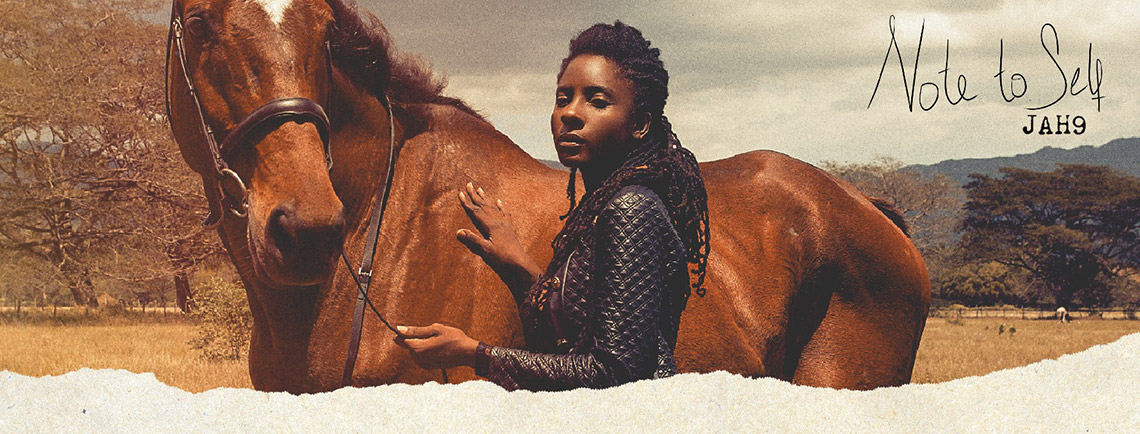
How would you summarise the story?
It's really my journey and where I am now. I've been in the industry now for over 10 years. I've declared my politics and my perspective, then I declared myself as an individual and now this is me - as a member of society, as a member of family, as a member of community. This is me in the world now. As opposed to me, the individual. This is how it unfolds when you have to interact with people so this is the story of all of us. That journey towards self knowing, self-governance and self love.
Let’s hear about your choice of co-producers for the album. Clive Hunt is still involved, Puraman who co-produced a track on 9 is back and Jeremy Harding, who produced the first single after the EP, Heaven (Ready Fi Di Feeling), is involved. But you've also selected some new people, Teflon, Runkus and Iotosh.
For me the new people are young people. And I wanted to integrate that. Because I do love the vintage, I love the roots so it's the easiest thing for me to find somebody who represents that. What was new to me was letting the young people be a part of the process too. So Teflon is a young person, he's younger than I am. And his approach to music is evolved because he is a more contemporary producer. But the more I watched him the more I also integrated into his vibe. Because the track that I worked on with him [New Race] started with Puraman but the song that I wanted to put on it didn't fit the tempo and the groove. And I was trying to get another producer to do a remake of the track and that didn't work. When I took it to Teflon he didn't flinch at all. He liked the song and he really did a good job just kind of giving me the mood that I wanted so I'm really happy with how that turned out.
And then Runkus and Iotosh was my surprise as well because I've been wanting to reach out to them. Runkus is like my little brother. I knew he works with Iotosh. Iotosh is more shy and reserved so I didn't really know him. But I reached and they sent me a few tracks and when I heard one track in particular, I remembered a song I wrote like 7 years ago. It's a song that I wanted to bring forward many times before but I just didn't find the right voice, sound or space to put it in. And then I heard the rhythm and thought “This is the rhythm for it”. And I brought it forward and I started to sing the song and everyone was like “This is perfect”. And we had to do very little else around that song. That was Highly.
In our last interview about the 9 album one of the final questions I asked was about whether you're afraid of anything. You said you were not really afraid of things in the outside world as much as inner turmoils and insecurities. And it feels like on this album, on songs like Heaven (Ready Fi Di Feeling), Ma’at (Each Man), Note To Self (Okay) and Could It Be, you are revealing inner struggle to your listeners...
Yes! Exactly. So it's a softer side. You present strength and you show “this is strength, this is what confidence looks like as a black woman”. It's important to present confidence and for the most part this is how I am. I'm fearless like that. There are a few things that really will shake me. But when I'm dealing with these internal things I'm dealing with them inside and I don't like to talk about them until they are resolved. So this is an opportunity for me to be a little more open and naked to say “These are struggles, struggles with the interpersonal, struggles with my own ego, struggles with my anxieties that are trying to break into my mind”.
Note To Self is that whole discussion. A lot of why I wanted to present the album this way has to do with how I have identified so many people I know who are going through so many mental health issues. A lot of the time they don't understand what's happening and end up using words like “anxiety” and “depression”. They don't really understand that there are steps and there is a process that happens before you can declare you are depressed. Like are you eating? Are you getting enough sleep? Are you properly hydrated? Are you constipated? Are you doing the self checks to prevent these things from happening? What is your birth sign? What is your astrological sign? What is happening in the celestial world? There are so many things that affect us, that whether you know they are affecting you, we have to try to reach a place where you can move through them and know “Yes, I am going to be ok. Yes this is happening but I am going to be ok”. And that is why the title track says I Am Going To Be Ok.
The world might be falling down around us but the space I want to hold, I am in control of what is happening with myself, I'm in control of what is happening over here. I might not have the love I want, I might be taken advantage of or disrespected by somebody but how am I receiving it? Am I going to take a lesson from it or is it going to affect my whole confidence? Am I broken down by it or can I treat adversity as an opportunity to learn?
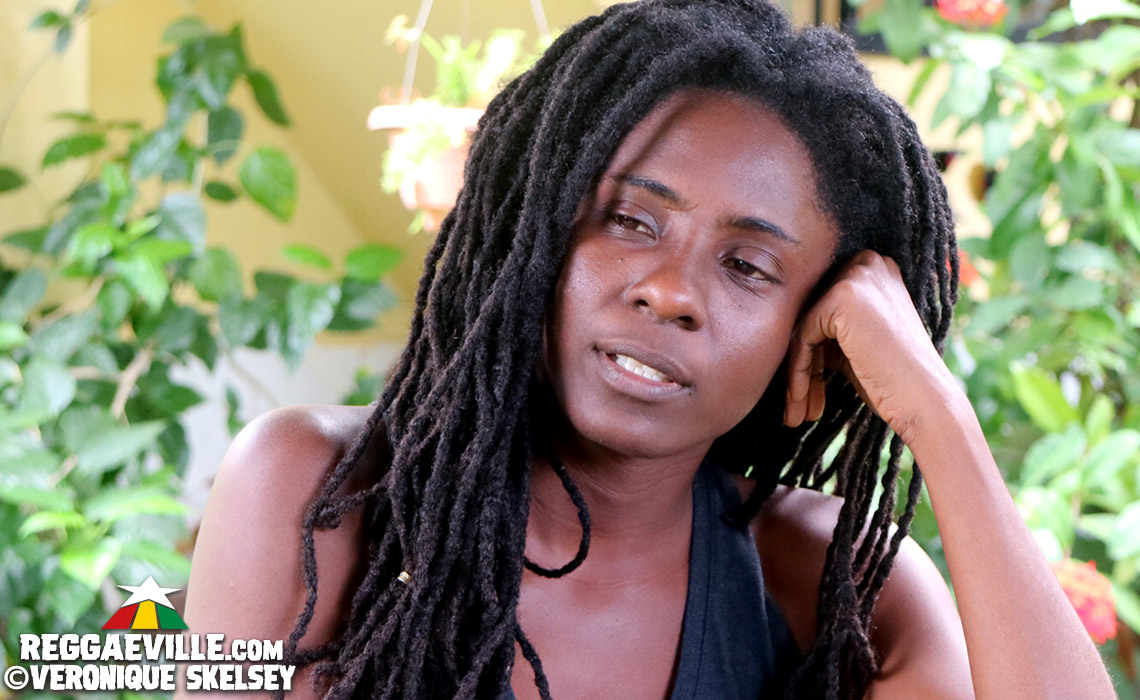
These are the discussions I want to incite in my communities because I'm the kind of artist where I don't just sit on stage. I'm a community artist. I bring people together in spaces. I bring people together who probably have never been together. I put conversations out there that might be a little uncomfortable but they are required for us to go there as a species, as men and women together, as black people and white people. I am making you just uncomfortable enough so that you can break open and grow. This is the work I am doing on myself and the work I'm called to do in my community as well. So this album, it's supposed to be just a little disturbing but just enough to incite some interesting conversation.
Some of the big combinations, with Chronixx, with Akala, with Tarrus they're quite slow and meditative. Some people would have said “I'm going to do a combination with Chronixx or Tarrus so that's going to be the most uptempo tune on the album”.
Yes! Everybody's moving towards these uptempo hype things right now you know? I just kind of feel like I serve something different. I'm not serving this industry. I'm serving a need because I work with people's feelings and I see what's happening in the human condition right now. Separate from when we go into a dance or a party to escape. I am the one they come to after my class and I see what they're actually going through. Sometimes it's not really like you need to jump up, jump up and get excited. What you actually need to do is in silence. I want to really make people explore the darker parts of themselves. Exploring that hidden part that they are a little uncomfortable with. These songs might make people uncomfortable but you literally have to push beyond your discomfort if you need to evolve. This is the journey I am experiencing, this is what I know so this is what I'm trying to share.
So with songs like these where I’m thinking of using these people - these are heavy tracks. So I use them to the advantage of getting people to listen to the tracks because those are the artists on them. So if it's a hype song you don't need a feature on that song because people will dance anyway. But if it's a serious song and they hear Chronixx’ voice they'll be pulled in. If they hear Akala and they are academics and they know who he is, they will be pulled in. And with Tarrus, I'm singing a song that's playful but it's also a tribute to doing what we love. It might not be music that you do but whatever it is, show up and show up ready do the thing. It's a beautiful thing, sometimes it's an exciting thing but beautiful doesn't necessarily mean hype. So I'm just trying to grow that.
As always I'm not trying to represent the feminine. I am the feminine (laughs) so I'm not trying to make a feminine album. But I'm going through that. I'm evolving as a woman also. When I started out I was in my 20s. Now I'm in my 30s changing into a different part of my life, thinking and considering different things. So my music has to reflect not just the times but me.
Also on several songs Field Trip, New Race and Ma’at you are experimenting with new vocal styles. You’re deejaying and rapping. We've talked before about how you didn't have a dancehall sound system background. Are you engaging with that more now?
(laughs) I remember when I started the project Clive said that he wanted to see me explore more of my foundation in spoken word. And I was very excited by that. Because that's literally my comfort zone. When I'm not thinking about melodies and all of that. It's a different part of my being that I used in this music industry when I was a poet. I wasn't considering anything but just being true to my word and twisting it and articulating it. So it was an opportunity to expand in that way. Even the [three album] monologues, they are poems but they’re prose. They are conversations where you kind of move the melodies out of it and just focus on the spittings. Spitting the words out. So it's something where it's not a new thing to me actually. It's older than me writing songs. It was an opportunity to kind of go back to my foundation.
Now I'm working with more contemporary types of rhythms and you do it in a certain flow but in my mind it’s the same thing. Because it's the spoken word. So if I'm doing it on a faster rhythm or on a slow rhythm, that's literally my comfort zone. Ok you still want to be recognisable to the core fans but this is something I can do too. And I wanted to explore that. Like in a way I wanted to say that as a poem. I wanted to spit it because you see the influence and impact that makes especially on younger people. If you're able to deliver that, it's a thing to express yourself in a different way and I love to appeal to another set of people too. My nephews are growing older and they are my audience too. So I'm thinking “what would excite them?” So I wanted to explore new paths and I'm always expanding. So it's really an expansion into a new thing sourced from the foundation thing. Which is my spoken word.
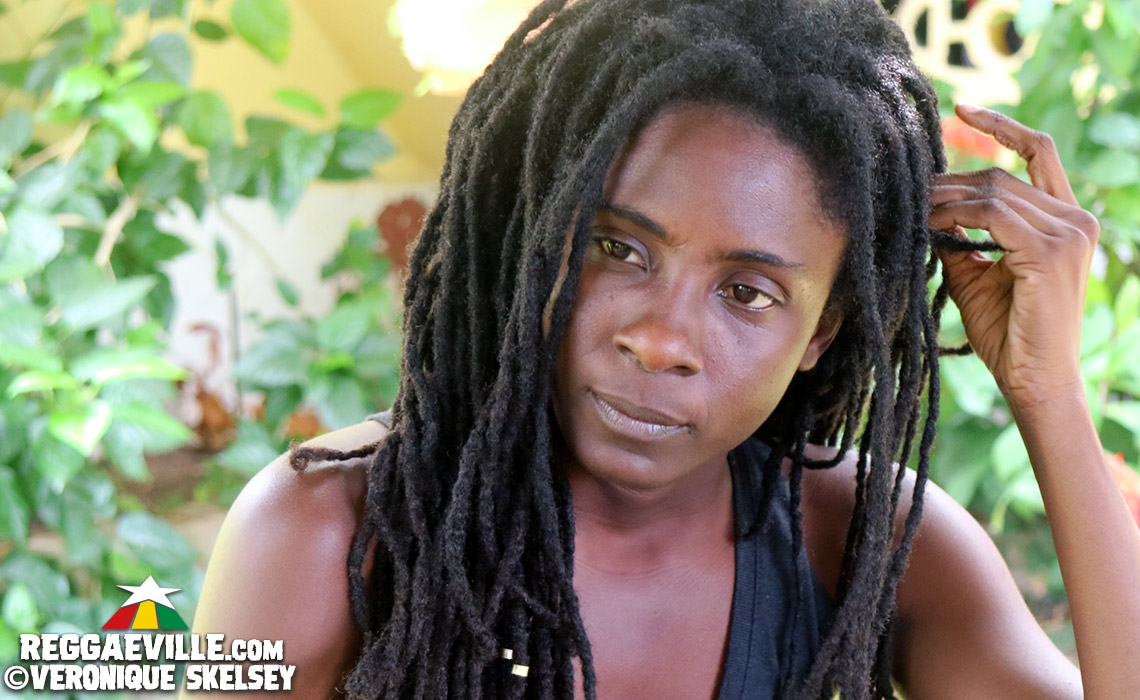
On Ma’at you do some dancehall deejaying but it's also very dub - there are some crazy tape delays. Was that Errol and Shane Brown who did that?
Exactly! They did. I wasn't actually there when they were doing the dub so when I was preparing to send it to them, I did my own version of how I wanted the dub to sound. Not that I wanted it to sound exactly like that, but I wanted them to know “During this part I want the dub to kind of disintegrate”. I wanted the song to be deconstructed so that it comes back like “Wow I didn't expect that!” And they did such an excellent job that it's like you're falling into the sound. It's like the floor has moved away and you fall into darkness and then you come back out, you've moved through time and space. I loved it.
The song is named after Ma’at, the ancient Egyptian representative of balance. The message of the song talks about ephemeral popularity. And of course music is a popularity contest from a certain perspective.
It is. Because I've always felt like I might be participating but I'm not really of this industry. So this is me kind of being a participant and observer looking around like “Wow. This is what it will take for me and I guess I don't want to do that because I don't feel drawn to do some of the things that are required of me”. So in the industry I am looked at in a particular way. Not in a negative but just in a particular way. And then outside of the industry in the other world that I exist in I'm looked at as an artist.
So it's an unique position to stand in. Because I look over at the deepest spiritual and the hardcore Rastafari and all that is being presented as the spiritual and cultural and then you realise over the years that you can't really tell much about a person just by looking at them on a superficial level. Because a lot of the most beautiful spirits, the most genuine people I've met, you wouldn't expect them to be. They don't have locks, they wear batty riders and false nails and false hair. But when you really sit with them they are truly honestly beautiful people. So we tend to judge people a lot. Even if you don't know that you put people into boxes.
So this is a song reminding you that at the end of the day you don't know who people are. It's not about knowing who people are as much as it is about knowing who you are. Because at the end of the day the principle of Ma’at points to the fact that we are each going to have to be responsible for ourselves. We are each going to have to be accountable to ourselves. In that moment of judgement. Whether it is at The End or at the end of the day. You are the one who has to face yourself, you are the one who has to live with yourself. So to each his own, you know?
How did you come to work with Chronixx on the title track? You worked with him before on the remix to your song from 9, Hardcore.
I reached out. And he was open. He is a young man where the relationship we had over the years is such that he will be willing to step up when it is asked. I don't really ask much of my peers but I did want him to be on this track. I wanted to do something else with him in a different kind of way. He is a very dynamic artist and I had a very easy time working with him before because he is so creative. But with Hardcore it was a song that was already done and then it was a remix so I really didn't get to to have that experience of creating something with him.
So now I used the opportunity to create from scratch and it was a really beautiful exercise. Because it was me, him, Iotosh and Runkus and it was the most collaborative thing I've ever done since I've been in this music industry. That song. That letting people in. That knowing “this is what I want to get” but when I get into the space, hearing what they want and integrating it. And I guess it was kind of interesting for them too because they are used to working with men who put up resistance. I didn't put up any resistance. I was so, so open.
By the time we finished putting the song together and back and forth, I went in and re-recorded my vocals to deliver the vocals in a different way. They were like “Why did you change the style?" I said “Because now it requires a different approach. Now it feels more like I want to present my voice in the softest, most spiritual I've ever put my voice out there”. So I went to a different place with my vocals for that song too. I love what collaboration brings out of me.
Let's hear about how you linked with Akala for the song New Race (A Way). We’ve talked before about reasoning with Vaughn Benjamin and this is another very interesting and original mind.
Well I consider myself an unusual mind, so that will happen! (laughs) Even on New Name, Cedric Myton is an unusual mind too. So I always kind of have that there. And it probably kind of represents the balance that I see in myself, like a balance for my own vibe. So Akala, I'm an academic as well but below him, he's got two PhDs. The first time I heard him speak, I think it was at Fire In The Booth. I remember hearing it and thinking “Man, this brother is reading!”
And then I met him and was very impressed that he was having that particular type of experience of life and sharing it as a musician. And sharing with his people. Just how articulate and poised he was and how unbothered he was by colonialism. Like “Yeah this is happening but this is information”. I just love that confidence, to see that in my brothers. So it's not somebody that I knew personally but he had done a song with Kabaka who is my brother. And I was like “Can we reach out to him?”
And I reached out. And it turned out I had met him at uncle Chinna's place and didn't know that it was him. So I just threw it out there like “Would you do a song?” And he said “Yes”. We went back and forth and I showed him what I had done and I expected him to deliver some fire! And he came back with something different from what I expected. And after I absorbed it I was like “This is what it needed”. It didn't need that fire. It needed him to be just as he was and I was very satisfied.
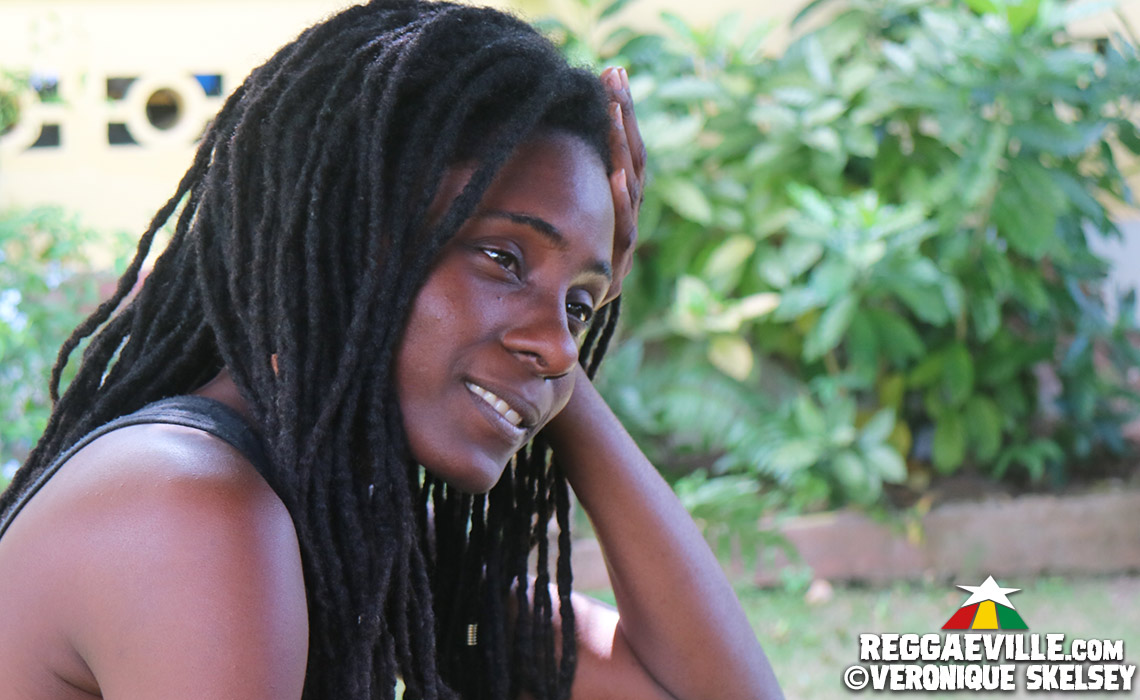
Can you tell me a bit about the meaning of the song Hey You - with the biblical reference to Joseph?
(laughs) So Hey You, like all the other songs, is a note to myself. If I look at it, it’s probably about a few different relationships I've had over the years. But it's also a note to myself too - talking in the mirror. Just going in, monitoring self, looking at how I deal with issues like being in this industry and being called to this particular work where it means that I am going to be in the limelight. Now I'm not here because I like the light. Those who know me know it is a sacrifice for somebody like me to live in the light. Because I require solitude so much. But then there are those outside who crave that.
Over the years I have had relationships with people who that light was very important to them. And now looking at life a little differently I realise I was going to lose friends over time because of jealousy, misunderstanding, insecurities and these kind of histories, they've created issues with different relationships that I've had to pass through. People who I thought I was building with and it turns out that what I was feeling towards them and thought was happening, was something completely different happening on their side. Because they were counting and monitoring different things than I was when I thought I was having a genuine experience with them. And when things started to get very positive and productive, they start to pull away and become defensive about things that are theirs.
It's just me growing up in my little bubble family and not going through a lot of drama with my parents and seeing them just love me unconditionally, I'm going out there thinking “Wow the world is a beautiful place”. And realising some people are carrying trauma that they are dealing with in their own way and you can't take it personally. And then looking at the parallel Bible story of Joseph and his coat of many colours. How he was favoured and it's like Joseph didn't need it. He wasn’t trying to be that but it's his destiny, he wasn't supposed to shrink himself. Then what he had to go through with the persecution that he bore at the hands of his own brothers. And it worked out that even that persecution was something he had to go through to save those very brothers. So I saw parallels in my own life with that as well.
At the same time I saw how throughout my life I have been very conscious that I don't want to be that person on the other side of that. I don't want to let jealousy and envy in. So whenever I see certain tendencies within myself to compare, I burn, I cleanse these things out of myself very quickly and just refocus on why I'm here. If I wasn't in the music industry I probably wouldn't be on Instagram. I’d probably be one of these people who didn't even have a Facebook account. When you meet people who are not on social media and you're like “Oh my god, awesome, wow!” That person who you're very envious of the luxury of them not having to interact with people on social media.
So it's kind of me navigating that whole world, trying not to let the noise and the negativity in. And observing how it affects the people around me too. And at the end of the day instead of saying “Bun badman”, “We don't need no friend”, it's more like “Hey you, I'm still here, remember us? There's still an opportunity for reconciliation.”
You've already talked about the meaning of the song Highly (Get To Me) in your interview with Billboard. One of the popular buzz-phrases that people in mainstream media might apply to the subject of the song is toxic masculinity. What do you think of that concept?
(laughs) Trust me, each of them can be toxic because you have the toxic feminine too! But the toxic masculinity because of the patriarchal society we live in, we feel that very ferociously. We see it because that's the time now, it's the man's world now. Operating on a very male-dominated left-brain type of way where there are wars being fought. There is a lot of weight being put on being macho and being strong in a particular way. But at the same time that time is shifting. That toxic masculinity is being challenged by a rising femininity. Femininity is now an extreme where women feel because they are now at the same economic level as a man, it becomes a competition and a power struggle.
And so Highly for me is not really about that. I don't focus on the toxic masculinity, it's more “Whatever it is you're doing, this is how it is affecting me”. And saying “Whatever is going on with you, I'm not trying to be absorbed into your world”. I'm saying “You can't come over here with whatever is going on, whether it is toxic masculinity or whether it is the vestiges of trauma that you have experienced. I'm not taking on your shit. I'm over here working on me. So I can't let you get to me until you are operating at a higher level. So I'm not even exploring what it is you're doing. I'm taking at face value. I'm not trying to dissect your mind right now”. I'm just saying “Whatever is happening over there is not working for me”.
One thing I noticed in the album credits is that Robbie Shakespeare has a writing credit for Feel Good.
Because he played the bass and you can't not put Robbie Shakespeare in the credits! (laughs) That bass-line is the shit. That bass-line is crazy. There's a certain level of musician where their contribution is always going to be weighty because of what they bring to the table. So Robbie Shakespeare, that is a musical contribution.
One of the more uptempo tracks on the album is You And I, the combination with Pressure Buss Pipe. It continues the VI connection that you had in your music for some years...
When I found out about those VI artists I was like “Wow, give thanks Jah! Because them holding the mantle firmly”. Like Rastafari music. For me if I want to listen to Rastafari vibration I’m listening to vintage Sizzla, maybe I Wayne or I'm listening to Vaughn. I feel that richness from there and Pressure is in my top 5 reggae artists right now. He's big. Since Love And Affection he hasn't let me down. Not one time. He did a show in Jamaica recently and he invited me to come and be a part of that. Just being on that show I realised like I know all of his music! I was singing word-for-word every song!
This brother is definitely one of my favourite artists. I did a song on his remix of Lion Is A Lion with myself and Kabaka - spitting again (laughs). I'm a music lover and whenever we go to Atlanta, we go to his house and my bass player plays music with him, so I've seen his process too. I've seen how humble and diligent he is in the studio and I thought “This is somebody I definitely want to be on the album”. I wasn't even thinking about the VI connection - he's in my top five over enough Jamaican artists! I think he is an incredible artist.
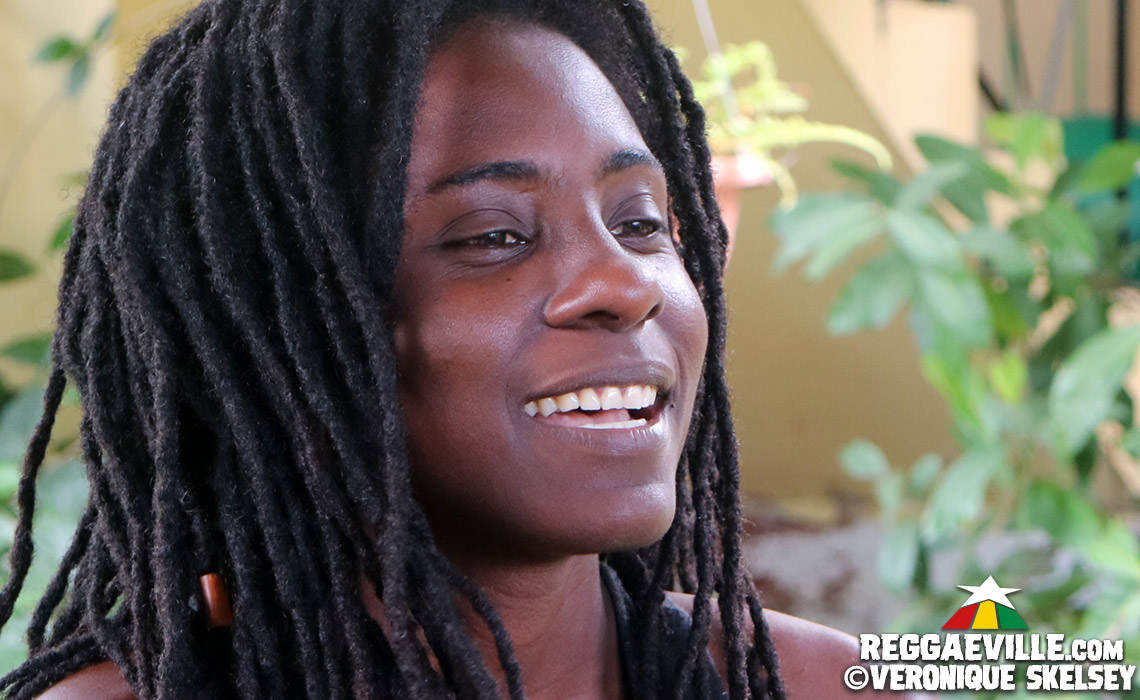
The song Ready To Play with Tarrus talks about how much music means to you. Tarrus has a reputation for taking music quite seriously.
Listen, Tarrus is in my top five as well. Vocally there is no match. Tarrus is my voice. Tarrus is my living voice. And seeing him live, Tarrus’ voice is extremely inspiring. When I'm on the road and he is on a show, no matter if I have somewhere to be, I have to see his show. I think his presentation is amazing and I think his voice is incredible. He is a spirit singer for sure.
I didn't really intend to put him on this song. It wasn't going to be a feature. I was the one singing “Tell me if you're ready to play”. And I was like “I'm not even doing this justice. I need to find somebody who will sing this the way I imagine it being sung”. And Tarrus’ voice was the perfect fit. When he came into the studio he was so enthusiastic. He does take his music very seriously and his whole process of recording and so on. So he went into the studio and he was giving me this sweet soft voice and I was like “No bro, I want you to use your big outside voice and belt this”. And then he did it and it's like “This is what it was missing”. So I had him just sing the parts that I thought he would do a better job at singing.
There's also the line in that song “Bassman, I just love to watch your fingers” - was that written for your bass player Jah David?
Yes! It is. When I was writing that song they were playing it. We were building the song while I was writing. I was literally watching Jah D play. Jah D is incredibly astute and diligent in his tone. That's what he's known for - his consistently incredible tone on his instrument. And he takes such pride in that. He is such a diligent musician. I write to a bass-line and when I start to concentrate on what he is playing that's where it happens.
The last song I want to talk about is Could It Be which has a real soul thing going on. I’d guess you are looking at a reflection of yourself… but I don't really want to guess the meaning...
I think if you guessed, you would probably be right! That's the thing about this record, it's easy to guess. This is me now, what I'm going through and as I tell you I am the participant observer. So I see her on stage, how people are reacting to her, this person that I put out there to face the world, to do the work. And then there is me the observer saying “Wow look at this, I'm just a reflection of them”.
And the music I'm making is very particular. I'm not making pop music. I'm making music that you have to chase to digest. You have to come for this. I’m seeing the people who come for it and the way they challenge you when they come. They're like it's not like “Oh wow this music is awesome, I love you”, it's more like “This is very important work you are doing. This music did change my life. This happened to me at this time in my life” and it's a lot! And if I am to take all that personally it could inflate one's ego. And this is why putting His Majesty up front is so important for me. And to just rely on people and be like “I am a work in progress too”.
Every time we do an interview I always bring up this topic but I'm going to approach it from a slightly different angle. Did you use anything from your unreleased first album with Beres for this project?
I almost did but I didn't. I went as far as opening the session and having musicians start to work and then I just didn't. So no there's nothing on it here. (laughs)




